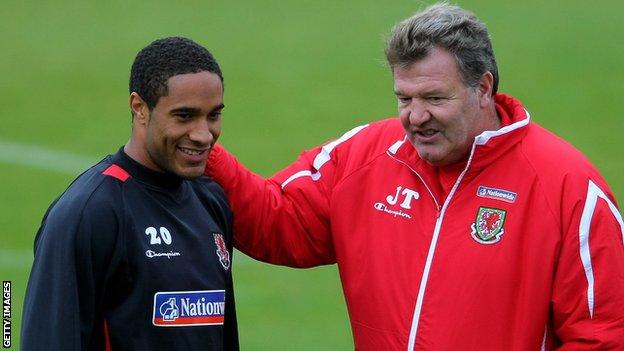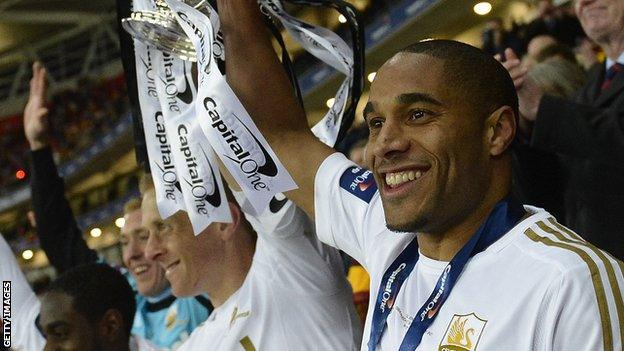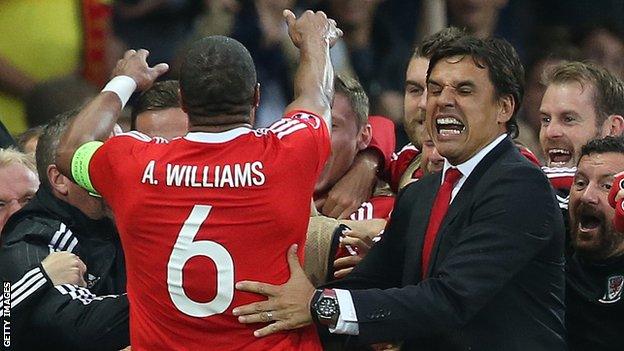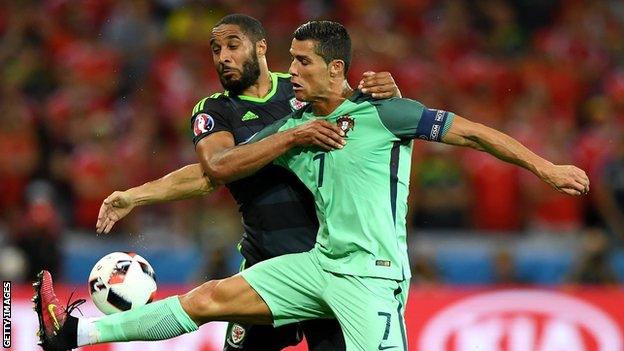Ashley Williams: Wales captain's 'unbelievable journey' comes to an end
- Published
Ashley Williams equalises for Wales against Belgium in the Euro 2016 quarter-final
It all began with an incorrect assumption.
It eventually ended with a place in the hearts of any Welsh football fan, certainly those who lived through the summer of 2016.
The legacy of Lille means the name of Ashley Williams, who has announced his retirement from football at the age of 36, won't be forgotten for some time.
Yet it all only really began when a punt was taken on his family heritage.
Playing for Stockport in the fourth tier 13 years ago, an enquiry on whether he had any Welsh links was only made on the off-chance the surname stemmed from this side of the Severn rather than the West Midlands where he had grown up.
It did not.
It was actually his mother's side where hiraeth had a home, and so - as he has vividly recalled in the past - so came the text message from the member of the Stockport management.

John Toshack (right) handed Ashley Williams his Wales first cap in March 2008
"You could nick a cap here."
He did. A total of 86, in fact, by the time he last pulled on the red shirt in a 1-0 defeat by Hungary in June 2019.
In that time he had won promotion through the divisions with Swansea City, captaining them in the Premier League, to a League Cup triumph and to acclaim in the Europa League, before a £12m move to Everton.
Then there is Wales, where he was among those who suffered the ignominy of being ranked 117th in the world and went on to lead them out at the semi-finals of Euro 2016.
Not a bad fare for the man who worked part-time as a waiter - as well as a petrol station attendant and at a theme park - having been released by West Brom as a teenager.
"He saw the other side of life - he saw what it was like to have a real job, a proper job," his former Wales manager Chris Coleman told BBC Radio Wales.
"When he got the chance to be a professional footballer I think that's why he played so many games and never missed training sessions because he knew how lucky we all are to be involved in this great game.
"He enjoyed every minute and gave everything that he had.
"I think that's why he was such an infectious character and why he was such a great leader, not just because of his ability to play football but because of his personality and the way he went about his business."
Williams restarted at local non-league side Hednesford, then to Stockport, then to Swansea, gaining the trust of John Toshack in the Wales set-up after his debut in Luxembourg in March 2008.
He hardly missed a game for club nor country since, mixing the toughness and simplicity derived from his humble beginnings with a class on the ball and a penchant for a searching diagonal that wingers for club and country so often lapped up.
He would boom encouragement to the youngsters around him, or make his feelings known if standards had slipped - even if it was on the touchline rather than a team-mate.

Williams celebrates League Cup success with Swansea City in 2013
Few will forget how - with shoulder dislocated after colliding with Jonny Williams in the dying stages of the 1-0 win over Northern Ireland in Paris - Williams and Chris Coleman eyeballed each other, the defender refusing to leave the pitch to see out the game.
"I'm fine," he screamed. Wales were with him at the back, Coleman's captain ever since easing Aaron Ramsey of the burden at the start of the then manager's turn in fortunes of the national side.
If togetherness was special in that Euro 2016 side, there was perhaps a special kinship between the centre-backs past and present as displayed when Williams celebrated with wild eyes that equalising goal against Belgium in Lille's quarter-final.
"When Ash nodded that one in he turned around and ran towards where we were all standing," Coleman recalls.
"Because he never used to score too many goals and to get a goal in that game and the importance of that game and with a header, he had such a shocked look on his face. We were all laughing.
"It's going to be one of those moments that we're never ever going to forget."
His angry nature on the pitch was purposeful - once admitting to starting arguments with opponents in games to fire himself up - but relaxed and good humoured off it, he was a leader in every way.
"Ashley Williams wasn't afraid to say his piece, I'll tell you that," Coleman added.
"In the Belgium game during qualifying and we were playing them at home, and we had two weeks with the players and I didn't want to play a friendly - I just wanted to train, work on a formation and what we were going to do to Belgium and what they were going to try and do to us.
"So we really drilled the players and they were really hard sessions, hard defensive sessions.
"One session went on and me and him were looking at each other because I was demanding and barking orders and he was looking at me and wanted to rip my head off if I'm honest with you because he had had enough of me pushing him and pushing the defenders and he let me know.
"I loved that because I much prefer that when somebody puffed their chest out to your face rather than go behind your back.
"That's why Ash is Ash and that's why he was such a great leader. He led the country as well as I've ever seen anybody lead a country."

Ashley Williams celebrates with Chris Coleman after his equaliser against Belgium at Euro 2016 in Lille
It was why Ryan Giggs kept the armband on him in 2018, even if struggles with form at Everton began and a loan move to Stoke had not provided the spark he needed to recapture past glories that had seen him acclaimed as one of the Premier League's best.
For the first time, he was deemed droppable, though his performance in the 1-0 Nations League win in Dublin was a reminder he still had much to offer.
Yet Giggs would soon look elsewhere. Williams had long tipped Gareth Bale as his successor as captain, just as he had Ethan Amapdu as his replacement at the back, both coming to fruition perhaps before he would have liked.
There was a period without a club - a time the now vegan Williams said made him feel comfortable about the thought of retirement - but his lack of games understandably cost him a place with Wales.
And although he remained part of the squad, there was clearly hurt when he had to watch on the periphery when the squad sealed a second successive European qualification when he had felt he had been playing some of his best football following a free-agent move to Bristol City.
He told BBC Sport Wales in May he was at peace with what the future held, but deep down was eying up the hook to hang his boots, his contract ended and offers elsewhere turned down.
There was still one Wales call, Williams withdrawing from the September squad to face Finland for personal reasons. Privately, he had all but decided that it was time.

Ashley Williams in action against Portugal's Cristiano Ronaldo in the Euro 2016 semi-final
That time officially came on Tuesday after 741 games across all levels of the English football leagues, and 86 caps with those nights of Euro 2016 "my greatest achievement and something I will never forget".
Of his "unbelievable journey" he now says "football has taught me so much both on and off the field and I will take this with me into the next chapter".
As he takes his coaching badges with the Football Association of Wales and with admirers of his influence at the association, there's every chance it will not be the end of Williams' story with Wales.
Who knows what the future will hold but, of the past, there is an argument to make that his performances at his peak place him among Wales' greatest captains, greatest defenders maybe.
After that incorrect assumption all those years ago, there is perhaps no arguments that he is Wales' greatest mistake.